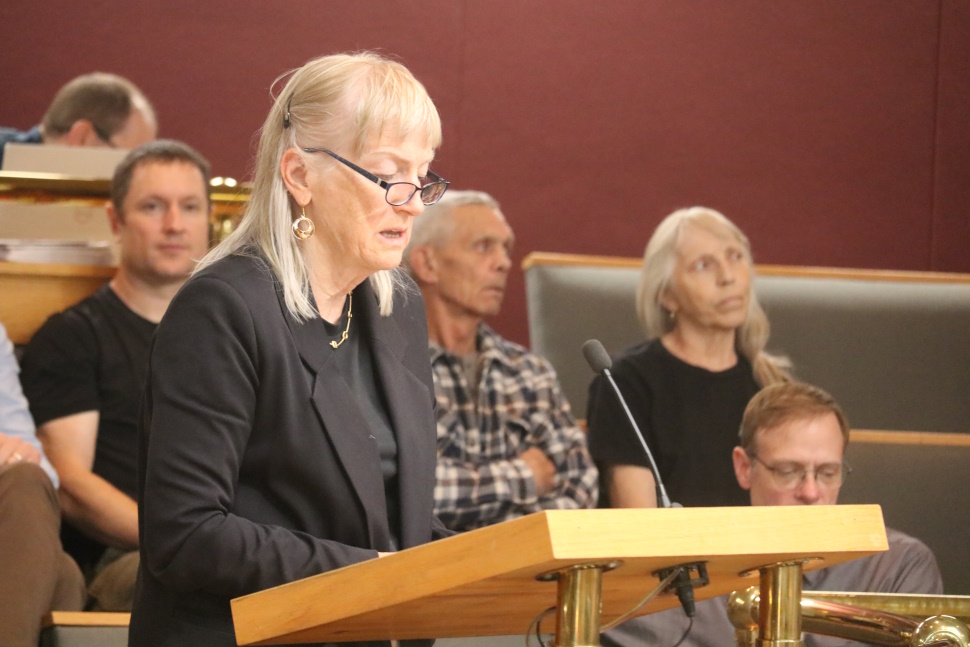A controversial amendment to the zoning bylaw to make supportive housing a discretionary use in the R3 (high-density residential), R4 (core mixed residential) and C2 (high-density commercial) districts passed its first two readings at Moose Jaw city council’s meeting last night.
However, it did not pass unanimously, delaying the third reading to the next city council meeting on Oct. 14.
Coun. Dawn Luhning asked for a recorded vote, and the two readings passed 4-3 with councillors Luhning, Heather Eby and Chris Warren opposed.
During the public hearing portion of the meeting, 10 delegates spoke both in support of and against the bylaw amendments. The delegates represented the Moose Jaw Non-Profit Housing Corporation, Square One Communities, the Downtown Moose Jaw Association, and both long-time and newer residents of the city.
Brenda Walper-Bossence, president of the Moose Jaw Non-Profit Housing Corporation, spoke about the need for supportive housing in the city and the message the amended bylaw would send.
“It means additional hearings, delays and costs for each project. This will discourage developers, non-profits and community partners from investing in the supportive housing that Moose Jaw so desperately needs,” said Walper-Bossence.
On the other side, long-time resident Shelley Hill was in full support of the bylaw amendment, saying it isn’t about whether or not people support supportive housing.
“It’s about ensuring supportive housing succeeds, and success requires transparency, communication and planning. This is where the discretionary process makes the difference,” Hill said.
The bylaw change stems from a city council meeting on July 14, when residents raised concerns about the development of a family support addiction treatment centre that will be operated by Ranch Ehrlo at the former Chez Nous care home at 1101 Grafton Ave. The property is owned by Trinity Real Estate of British Columbia and Ranch Ehrlo is leasing it. The bylaw passing will not change the status of the project at the former Chez Nous building.
The development and building permits were issued because the property is within the R3 – high-density residential district, where supportive housing was a permitted use, so no public notice or discretionary use approval from council was required.
Residents said at the July meeting that Ranch Ehrlo distributed flyers to some of the neighbours, but not all, and raised concerns about communication.
Ranch Ehrlo told Discover Moose Jaw that they have been operating in the city for the past 10 years and were open to the idea of public consultation. A motion was passed at that meeting directing city administration to formally request Ranch Ehrlo hold a public information session and continue researching supportive housing regulations elsewhere, including recommendations for the new zoning bylaw.
At the Aug. 11 city council meeting, Coun. Patrick Boyle brought forward a motion to amend the zoning bylaw to make supportive housing a discretionary use for R3, R4 and C2 zoning districts.
Despite an administrative report outlining the legal, operational and financial risks of the change, Boyle’s motion narrowly passed 4-3 with Mayor James Murdock and councillors Boyle, Carla Delaurier and Jamey Logan in favour, and Luhning, Warren and Eby opposed.
On Monday night, Eby, Warren and Luhning again voiced concerns about litigation. Warren also pointed out the city is reworking the zoning bylaws with new definitions either later this year or early 2026.
“I fully believe that Moose Jaw urgently needs more supportive housing options to meet the growing demand and improve the community well-being,” Warren said.
“I believe that the current proposal before us creates barriers and introduces delays, discourages investments, and risks legal challenges and human rights concerns. It sends a message that people needing supports are subject to scrutiny in their choice for residence.”
Eby also felt that it would not matter if the bylaw amendment passed because, if it became discretionary use, residents would still be opposed to the location and no council would vote in favour.
“Discretionary could equal discrimination and everyone here said, I support supportive housing, I support supportive housing, I support supportive housing. Underlying, just not in my neighbourhood,” Eby said.
The only councillor who spoke who was in favour was Logan. He focused on the upcoming reworking of the zoning bylaw and felt it wasn’t “the end of the world” if the amendment passed, as it would only be in effect for a few months until the overhaul of the zoning bylaws is completed.
